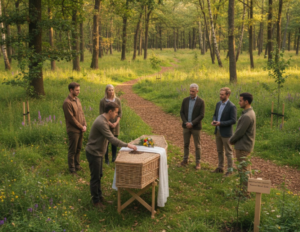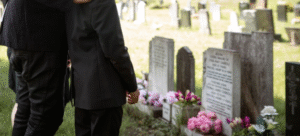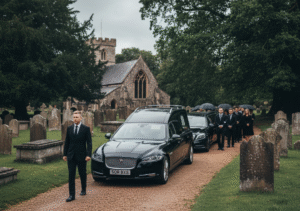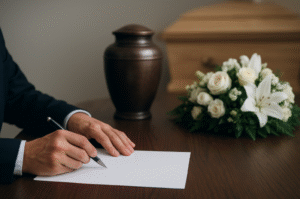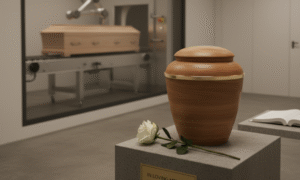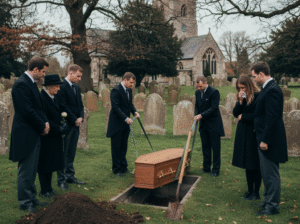Funeral traditions in the UK are shaped by a rich mix of cultures and faiths. At Gooding Funeral Services, we are often asked how different communities honour their loved ones, and what practical considerations families should keep in mind. While every family is unique, certain customs are deeply rooted in religious and cultural beliefs. Understanding these traditions helps us guide families with respect, care and accuracy.
In this blog, we’ll explore the main religious and cultural practices we encounter in the UK.
1. Christian Funerals
Christian funerals remain the most common in the UK. While practices can vary between denominations, there are key traditions that shape most services.
Rituals and Service
Christian funerals usually take place in a church or chapel, though some families opt for crematorium chapels or other venues. Services are typically led by a minister, priest or vicar, and often include prayers, scripture readings and hymns. A eulogy may be delivered by a family member or friend.
Burial or Cremation
Historically, burial was the norm, often in churchyards. Today, cremation has become more common, but many still choose burial to follow tradition or personal wishes. Some denominations, such as Catholicism, prefer burial but now generally accept cremation provided ashes are treated with respect. Read more about burial: Process, Traditions and Modern Choices.
Also Read: Types of Funeral Services in the UK
2. Muslim Funerals
Muslim funerals, guided by Islamic law (Sharia), are among the most time-sensitive traditions we accommodate. Families often seek burial as quickly as possible, usually within 24 hours of death.
Preparation and Prayers
The body is washed (ghusl) and wrapped in a plain white shroud (kafan). The funeral prayer (Salat al-Janazah) is performed by the community, often at a mosque or in an open area.
Burial Practices
Cremation is strictly prohibited in Islam. Burial involves laying the body directly into the earth, positioned so the deceased faces Mecca. Grave markers are usually simple, reflecting humility and equality before God.
3. Hindu Funerals
Hindu funerals are centred on the soul’s journey towards rebirth, with rituals intended to release the spirit.
Ceremonies and Rituals
Traditionally, the body is bathed and dressed in white. Mourners gather for prayers and mantras led by a Hindu priest or elder. The service often includes offerings of flowers and incense.
Cremation as Central Practice
Cremation is the preferred custom, symbolising the release of the soul from the physical body. In the UK, this takes place at a crematorium. The eldest son or closest male relative typically leads the rites, sometimes pressing the button to begin the cremation. Ashes are often scattered in a river or, when possible, taken to India for scattering in the Ganges.
4. Sikh Funerals
Sikh funeral practices (Antam Sanskaar, meaning ‘the final rite’) combine solemnity with spiritual reflection.
Service and Scriptures
The service may take place at the family home, a Gurdwara, or a crematorium. Prayers are read from the Guru Granth Sahib, and hymns (kirtan) may be sung. Mourners wear modest white clothing as a sign of respect.
Cremation and Mourning
Cremation is customary, with ashes often immersed in a river. Mourning is less about grief and more about acceptance of God’s will. Families may hold prayers for several days following the funeral, culminating in a continuous reading of the Guru Granth Sahib.
5. Jewish Funerals
Jewish funeral practices are rooted in centuries-old traditions, focusing on dignity and simplicity.
Quick Arrangements
Burial usually takes place within 24–48 hours. The body is washed and wrapped in a plain shroud (tachrichim), and a simple coffin is used.
The Service and Burial
Funeral services are brief and conducted by a rabbi. Mourners recite prayers such as the Kaddish, and burial is the only accepted practice. Cremation is not permitted in most Jewish traditions. After burial, the period of mourning known as Shiva begins, during which mourners stay at home to receive visitors and pray together.
6. Humanist and Non-Religious Funerals
Not all families follow religious traditions. Humanist or non-religious funerals focus on celebrating the individual’s life and values without religious references.
Personalised Services
Ceremonies are often held at crematoria, natural burial grounds, or other venues chosen by the family. A celebrant usually leads the service, guiding readings, music and personal tributes.
Burial or Cremation
Families may choose burial, cremation, or green funerals such as woodland burials. The emphasis is on personal choice, storytelling and memory rather than prescribed rituals.
Supporting Families with Sensitivity
Every family comes to us with their own expectations, shaped by faith, culture and personal wishes. At Gooding Funeral Services, our role is not just to manage logistics but to ensure every detail respects these traditions. Whether arranging a Muslim burial within 24 hours, guiding a Christian family through hymns and readings, arranging any Asian funerals, or supporting a humanist celebration, we approach every service with sensitivity and understanding.
Funerals are deeply personal, and no two are ever the same. By recognising and honouring the diversity of practices across the UK, we help families feel supported at one of the most difficult times of their lives. We serve throughout the UK in cities like Leeds, Manchester, Doncaster, Bradford, Huddersfield and more.
Read more from our guide on funeral services in the UK.
Pages You Might Like:
Funeral directors UK, Funeral services UK, Funeral Services in Leeds, Funeral directors Leeds, Funeral Directors in Bradford, Funeral Directors Bradford, Funeral Directors Manchester, Funeral Directors Huddersfield, Funeral Services in Doncaster, Asian Funeral Services, Hindu Funeral Services, Sikh Funeral Services, Caribbean Funeral Service


